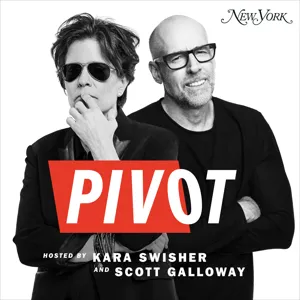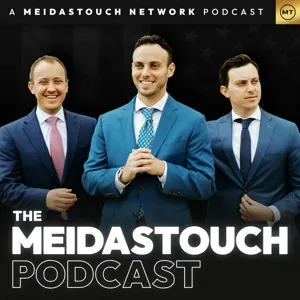Podcast Summary
Silicon Valley Bank's Failure: Poor Management and Low-Interest-Rates: Silicon Valley Bank's failure was due to poor management decisions and the Fed's prolonged low-interest-rate policy, leading to significant losses on overpriced bonds and mortgage-backed securities. Panic ensued, causing a market cap plummet and FDIC control within 48 hours.
The failure of Silicon Valley Bank, the 16th largest bank in the US, was a result of poor management decisions and the Fed's prolonged low-interest-rate policy. The bank's management invested heavily in overpriced bonds and mortgage-backed securities, which lost significant value as the Fed raised interest rates. When rumors of the bank's troubles began circulating, depositors rushed to withdraw their funds, forcing the bank to sell these securities at a loss, exacerbating the problem. Bill Cohen, a financial journalist and former banker, explained that this situation could have been mitigated if people had remained calm and not panicked. The bank's market cap plummeted from over $15 billion to FDIC control in just 48 hours. While the actions of certain venture capitalists may have also played a role, the primary cause was management error and the Fed's monetary policy. This incident underscores the importance of sound decision-making and the potential consequences of prolonged low-interest-rates.
Mismatched durations and concentration risk caused recent financial instability: Institutions investing in long-term securities but borrowing short-term and concentration of funds among a few individuals can lead to financial instability. Diversification and liquidity are crucial in the financial industry.
The recent financial instability can be attributed to a combination of the age-old issue of mismatched durations and unexpected concentration risk. Mismatched durations occur when institutions invest in long-term securities but borrow short-term, leading to a liquidity crunch when investors demand their money back. The unprecedented increase in the federal funds rate from 25 basis points to 475 since 1979 further exacerbated this issue. However, the concentration risk was less anticipated. A few dozen individuals, specifically tier 1 VCs, called for their portfolio companies to withdraw their money en masse, leading to a significant withdrawal of funds. This concentration wasn't just sector-specific but concentrated among a couple of dozen individuals. While some VCs stood with the bank, others like Andreessen Horowitz, Sequoia, and Peter Thiel's Founders Fund, were noticeably absent. The reasons for their absence remain unclear, but speculation ranges from an organized conspiracy to taking advantage of the situation to simply protecting their own interests. Regardless, the interplay of mismatched durations and concentration risk highlights the importance of diversification and liquidity in the financial industry.
Silicon Valley Bank's Risky Investment Causes Losses and Uncertainty for Depositors: Despite known risks, Silicon Valley Bank invested depositors' excess funds in the bond market, leading to significant losses and uncertainty for depositors, potentially resulting in asset purchases, liquidation, or government intervention. Best-case scenario: insured funds are returned, but it may take time and could be paid out in dividend certificates.
The Silicon Valley Bank's decision to invest depositors' excess funds in the bond market during a time of rising interest rates, despite the known risks, led to significant losses when they had to liquidate their assets. This decision, made at the epicenter of the financial system, caused ripples throughout the industry, leaving depositors worried about the safety of their funds. The aftermath includes potential asset purchases, liquidation, or government intervention. The best-case scenario for depositors is to receive their insured $250,000, but it may take time and could be paid out in the form of dividend certificates. The FDIC's response has been relatively quiet, and the full impact on the financial system remains uncertain.
SVB Crisis: Different from 2008 Financial Crisis: Experts believe SVB receivership may lead to operational issues, potential monopoly power, and government intervention, but depositors will likely get most of their money back.
The recent events surrounding Silicon Valley Bank (SVB) have raised concerns about the stability of the banking industry and the potential for systemic risk. However, the experts believe that the situation is different from the 2008 financial crisis. They explain that if SVB goes into receivership, depositors will likely receive most of their money back, but the process may take time. The unintended consequences of this event could include operational issues for companies and a potential shift towards monopoly power in the banking sector, leading to higher fees and a less robust banking system. The government is expected to intervene to prevent a mass exodus from smaller banks and to maintain confidence in the financial system. Additionally, there is speculation that fear may soon give way to greed as investors look for opportunities in the aftermath of the crisis.
Potential Acquisition of Silicon Valley Bank: Discussions of SVB acquisition by large institutions, government support, approval needed from Federal Reserve, venture capital firms as alternative, Elon Musk's interest, impact on customers uncertain
There are discussions about potential acquisitions of Silicon Valley Bank (SVB) by large financial institutions, such as Goldman Sachs, with the support of the government. This could be an attractive option due to SVB's significant assets under control. However, any acquisition would need to be approved by the Federal Reserve, and the history of past acquisitions of troubled banks has been complex. Venture capital firms may also step in to support their portfolio companies by providing zero-interest loans, potentially reducing the need for consolidation. Elon Musk has also expressed interest in buying SVB and making it a digital-only bank, but this seems unlikely. Regardless, the impact on customers is a significant concern and remains to be seen.
Silicon Valley Bank's Uncertainty and FDIC's Role in Customer Protection: Silicon Valley Bank's instability has raised concerns for customers about their financial security. The FDIC's role in protecting deposits and potentially repaying loans could expedite the process. Companies should communicate transparently with stakeholders about their financial situation and liquidity plans.
Silicon Valley Bank (SVB) primarily caters to a specialized clientele, including startups and tech projects, and has a significant presence in funding notable companies like Roku, Circle, Roblox, and Vox Media. The bank's recent financial instability, which led to concerns about customer deposits and potential insolvency, has left some customers uncertain about their financial security. The FDIC's role in ensuring depositor protection and potential repayment of loans to expedite the payout process is a topic of speculation. Companies and their boards should prioritize transparent communication with investors and stakeholders regarding their financial situation and liquidity plans. Despite the ongoing uncertainty, this situation may not qualify as a traditional bailout, as the shareholders and management have already been wiped out. The conversation revolves around the moral hazard of bailing out venture capitalists and the potential implications for capitalism and social welfare.
SVB's Collapse and Financial System Stability: The collapse of SVB highlights the importance of transparency, adequate risk management, and effective monetary policies in maintaining financial stability. Regulators and the industry must learn from this event to prevent future crises.
The collapse of Silicon Valley Bank (SVB) has raised concerns about the stability of the financial system and the potential for contagion to other institutions. The banking industry and regulators are under pressure to restore confidence and prevent further damage. The situation recalls the 2008 financial crisis, but the risks are not as severe for SVB. However, the lack of transparency and adequate risk management at SVB, combined with the low-interest-rate environment created by the Fed's monetary policies, contributed to the bank's downfall. The absence of a chief risk officer and the CEO's questionable actions add to the scrutiny. The industry and regulators must learn from this event and address the underlying issues to prevent future crises.
Effective regulation and transparency in cash management practices: Mark securities at current value during market fluctuations for accurate reporting and financial stability. Regulations are necessary to maintain depositor confidence and prevent mass withdrawals.
Effective regulation and transparency in cash management practices are crucial to prevent financial instability and potential contagion. The Silicon Valley Bank case highlights the importance of marking securities at their current value during market fluctuations, rather than their projected value at maturity, to ensure accurate public reporting and financial stability. Additionally, the failure of Silicon Valley Bank and Silvergate, which share an unusually sensitive depositor base, underscores the need for regulations to maintain depositor confidence and prevent mass withdrawals. Looking forward, AI technology has the potential to revolutionize industries and create more jobs, as exemplified by the pizza production industry's use of AI for quality control. Overall, the interconnected nature of financial systems and emerging technologies necessitates a balanced approach to regulation and innovation.
Banking Crisis and Depositor Behavior: The banking crisis underscored the importance of a stable, competitive banking system. Depositor behavior led to potential domino effects, but concentration of banks could increase fees and dampen economic activity. A well-managed banking system is crucial for entrepreneurs, small businesses, and continued economic growth.
The recent banking crisis has highlighted the potential fickleness of depositors and the importance of having a robust, competitive banking system. The crisis saw depositors rushing to withdraw their funds from banks, leading to a Jenga-like effect where one bank's failure could potentially trigger a domino effect. Some argue that this could lead to a concentration of banks over time, with depositors putting their money into the most "bulletproof" institutions. However, this could have negative consequences such as increased fees for businesses and dampened economic activity. It's crucial that depositors are made whole and the banking system remains competitive to ensure continued economic growth. The banking industry provides essential services, particularly for entrepreneurs and small businesses, and the cost of these services should not be significantly increased due to a lack of competition. Ultimately, a well-managed banking system that acknowledges and manages risks properly is a great business, especially in times when the cost of goods sold and raw materials are essentially free.
Bank Failure and Depositor Protection: Despite size, bank failure raises questions about depositor protection. Short-term job losses possible, long-term market opportunities. Outcome uncertain with potential buyers.
The failure of a risky business model bank, despite its size, raises questions about the protection of depositors' funds. While some argue for letting the bank fail and allowing shareholders and management to bear the losses, others believe depositors should be made whole. The short-term impact of the bank's failure could lead to job losses due to payroll issues, but in the long term, the vast opportunities in the market may lead to new competitors rising up. However, the failure may also provide an excuse for management and boards to lay off employees. Ultimately, the outcome remains uncertain, with potential buyers being speculated to step in and purchase parts of the bank's assets.
Government intervention in banking during financial instability: During financial crises, governments may backstop banks, leading to short-term relief for depositors, but potential long-term implications can cause bidding wars and shifts in banking business. Stay calm, remember past recoveries, and leverage teamwork and shared intelligence to navigate through challenging times.
During times of financial instability, the government may step in to backstop banks, providing a brief reprieve for depositors. However, the long-term implications can lead to intense bidding wars and potential shifts in banking business. Entrepreneurs may face challenges, but it's essential to remember that things are rarely as bad as they seem. History shows that banks can recover and even thrive after crises. As Bill mentioned, the financial sector rebounded significantly after the 2008 crisis. It's crucial to stay calm and maintain perspective. Additionally, the importance of teamwork and shared intelligence, as demonstrated by Atlassian's AI-powered tools, can help individuals and businesses navigate through challenging times more effectively.






